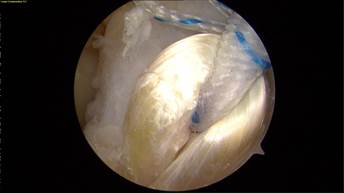Being a physician trained in sports medicine, Dr. Nordt treats all patients with knee problems with the goal of aggressive recovery and full return to the activities they enjoy. Dr. Nordt strives to manage his patients with non-operative options whenever possible. Rehabilitation is often the mainstay of a conservative treatment program. Medication and injections to reduce inflammation are also useful.
If thorough, non-operative management is unsuccessful, knee surgery may be the next-best option. If surgery is recommended, minimally-invasive procedures such as knee arthroscopy are the preferred choice.
As a leading orthopedic physician in Richmond, VA Dr. Nordt performs over 200 knee replacements each year and he prefers to perform knee arthroscopy in every possible case.
About Knee Arthroscopy
Knee arthroscopy is a surgical procedure that uses an arthroscope, or small camera, to look into the knee joint. The camera displays magnified images on a computer screen and from these pictures, Dr. Nordt is able to guide small surgical instruments within the knee joint. Both the arthroscope and surgical instruments are thin and delicate. The result is small incisions with minimal tissue trauma, as opposed to traditional open surgical techniques.

Knee problems may result from an acute injury, overuse or the normal wear and tear of the aging process. Knee arthroscopy is utilized to address the pain associated with these problems. Typical knee arthroscopy procedures include: Torn anterior cruciate ligament, torn meniscus, removal of bone or cartilage, infection and kneecap problems, among others.
Post-Operative Recovery
Knee Arthroscopy is generally performed as an out-patient procedure, but may sometimes require an overnight hospital stay. Dr. Nordt will explain in detail what your post-operative recovery will be like based on your needs and personal history.
This surgery has a very high success rate, so given normal conditions, your recovery will be smooth and relatively quick. Under normal circumstances, you should be able to return to normal activity within 4 to 6 weeks.
